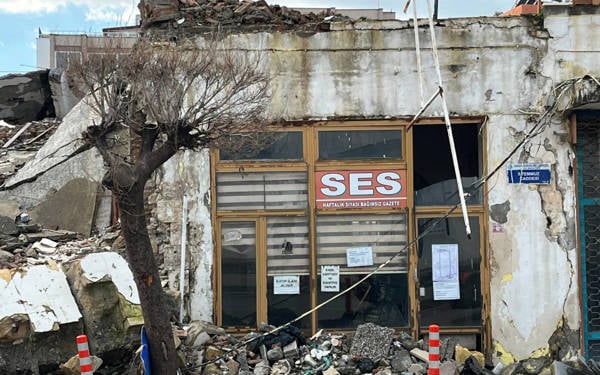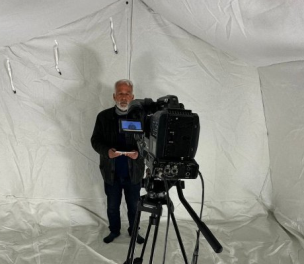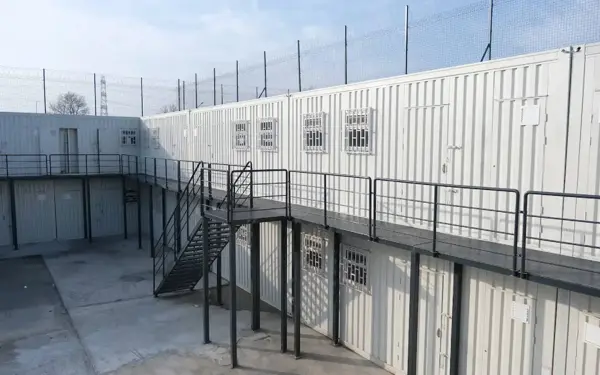Click to read the article in Turkish
Ali Leylak, a seasoned journalist with 28 years of experience, serves as the Demirören News Agency (DHA) representative in Urfa.
In the earthquakes, he lost relatives and friends from other cities affected by the February 6 earthquakes.
CLICK - Special series: Six months on from Turkey earthquakes
From the very first moments, he both tried to rescue his family and continued producing news reports. "My children were freezing outside, yet I was occupied with the news. When news of my relatives' deaths arrived, I was live on air. Journalism is like this," he says.
"I was in Urfa during both earthquakes. I was caught live on air during one. In the first earthquake, I gathered my family, tried to get my daughters downstairs, all the while recording the moment with my journalistic reflex.
"I was still recording when I descended. I captured the tremors, the chaos, the evacuations. We were the first to broadcast the initial images of the earthquake to both Turkey and the world."
"The newsroom told us that Maraş was the epicenter of the earthquake. They asked us to go there.
"At that moment, it was snowing, cold, and my family was outside. Leaving them behind to chase a story felt like torment, but news doesn't wait. I made sure my family was safe and set out. The roads were closed, they said the roads were impassable. I turned back.
"Following this, I started gathering information about the destruction in Urfa. We were live on air during the second earthquake. Three buildings beside us collapsed during that tremor. People were standing idle, looking at each other. 'Where do we start? How do we deal with it?' they asked each other. There was a sense of helplessness.
"The scene we encountered was truly a tragedy. People trapped under debris, cries, children's voices, women's voices... I can't get them out of my mind."
"Suppressing emotions while reporting"
Leylak, like thousands affected by the earthquake, lost friends and relatives in Adıyaman, Hatay, and Maraş. Among his losses was his colleague and fellow journalist İzzet Nazlı and his family in Hatay.
He could only receive news of their deaths a few days after the earthquake. "Communication was cut off. There was no internet connection. There was no infrastructure. Search and rescue teams hadn't arrived," Leylak says.
"I've been a journalist for 28 years. From the early years of the war to today, I've covered events in Syria. I've faced similar tragic events many times. But I've never experienced anything like this."
"My children are freezing outside, yet I am occupied with the news. I've lost loved ones, but I don't react. We are obliged to report the news in the moment, driven by our journalistic reflex. We have to go live. We suppress our emotions."
"But when we lay our heads on the pillow at night, or when we're alone at home, it hits you. You won't see them again, you won't speak to them, hear their voices, receive news from them. That's when you realize. It's proof that journalists also go through their own tragedy."
"Local press has forgotten the quakes"
Leylak points out that there are 18 print newspapers and 8 internet media outlets recognized by the Press Advertisement Institution (BİK) in Urfa. Additionally, the city has four local television channels. According to Leylak, the local media has already forgotten the earthquake.
"Six months have passed since the earthquake, and demolition still continues. There were demolition orders for over 6,000 buildings in the city, of which 2,500 have been demolished. Yet there are still around 3,500 buildings awaiting demolition."
"As a news agency, we continue to cover earthquake-related work. We witness demolition efforts, we see damaged buildings standing. In some areas, streets are closed to both pedestrian and vehicular traffic. These issues continue to pose a threat to the environment."
"After the earthquake, Urfa was hit by a flood. 18 citizens lost their lives. Infrastructure work still remains incomplete. Riverbeds remain unchanged. Initially, heavy machinery arrived as a token effort. They opened a few channels, but then the rehabilitation work ceased.
"In Urfa, no journalism is being done to solve these problems. Urfa has forgotten both the earthquake and the flood. The city is forgotten the day after a disaster or event. The agenda changes so quickly... One incident after another.
"Earthquake, followed by a flood; after the flood, accidents; after accidents, street fights, clan disputes, electricity problems, water problems... The issues have multiplied. But they are all forgotten and left behind the next day... The media doesn't pursue them." (HA/VK)





.jpg)






